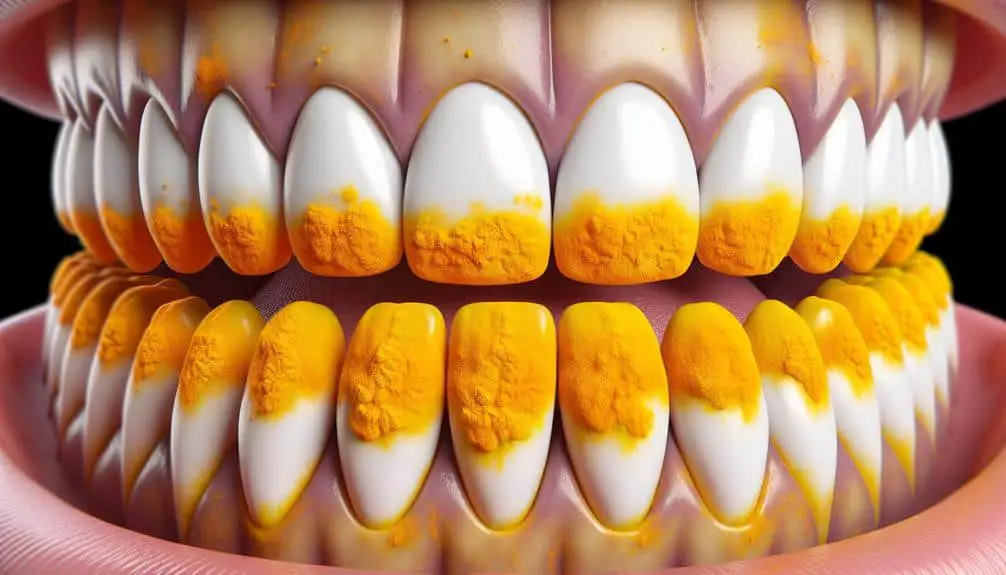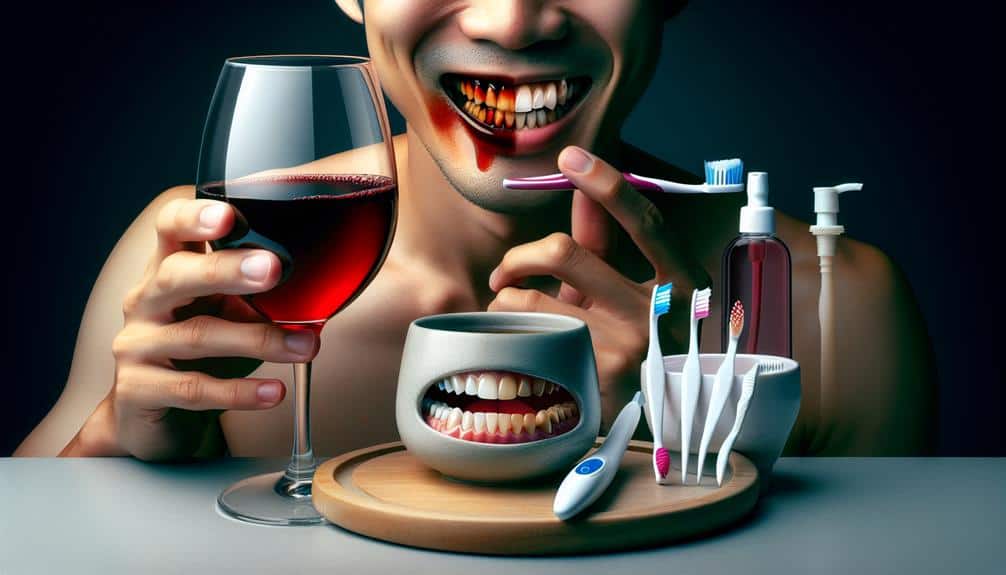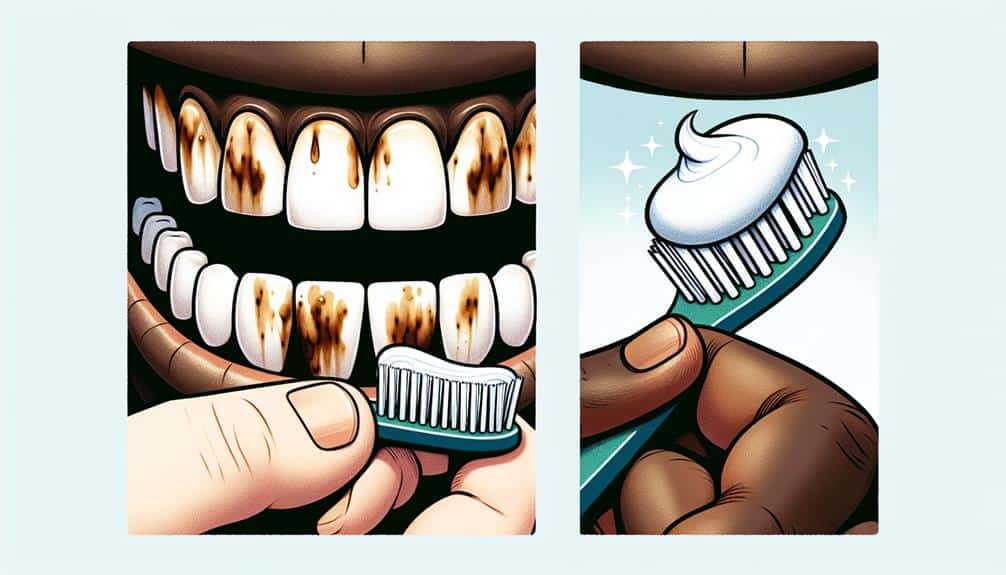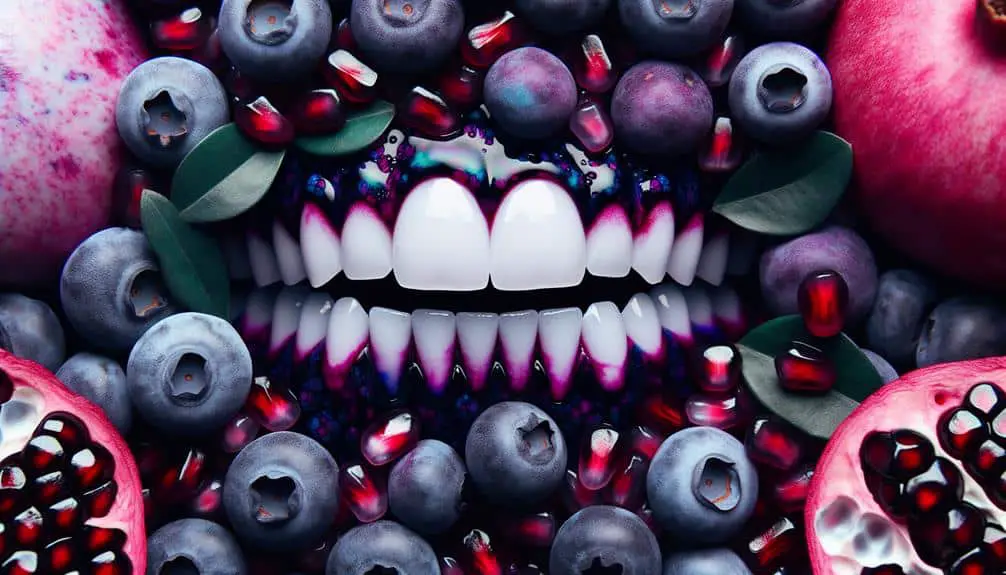Turmeric and curry stain teeth because of the pigments, like curcumin, that stick to your enamel and end up deeply penetrating it, causing tough stains. The porous nature of your enamel makes it easy for these pigments to hang around. Ensuring diligent oral hygiene, like brushing twice daily, using straws for turmeric drinks, and exploring teeth whitening techniques, can help prevent and manage these stains effectively. Remember, there are also foods rich in antioxidants and natural cleaners that can aid in whitening your teeth and fighting plaque buildup. Improve your smile by taking care of your pearly whites!
Key Points
- Turmeric's pigments adhere to enamel due to its porous nature, leading to deep staining.
- Curry's pigment content can stick to teeth, causing discoloration over time.
- Some curry recipes are acidic, potentially weakening enamel and promoting stains.
- Inadequate oral hygiene post-consumption can exacerbate turmeric and curry stains.
- Prevent staining by maintaining good oral hygiene, rinsing after turmeric, and exploring whitening options.
The Science Behind Turmeric Staining
Understanding the chemical properties of turmeric reveals why it has the potential to stain teeth. Turmeric contains pigments known as curcuminoids, primarily curcumin, which are responsible for its vibrant yellow-orange color. These turmeric pigments have the ability to adhere to surfaces, including tooth enamel. Enamel, the outermost layer of the tooth, is porous despite its hard structure. When turmeric is consumed or applied, the pigments can be absorbed by the enamel. Enamel absorption occurs as the pigments seep into the microscopic pores of the enamel, leading to the discoloration of teeth over time.
The turmeric pigments' affinity for binding to enamel makes it challenging to remove these stains through regular brushing alone. The porous nature of enamel allows for the deeper penetration of pigments, causing the stains to become more ingrained. This understanding of how turmeric pigments interact with enamel sheds light on why turmeric has the potential to stain teeth and why these stains can be persistent if not properly addressed.
Currys Impact on Tooth Discoloration
Curry can contribute to tooth discoloration due to its pigment content and the way it interacts with tooth enamel. When consuming curry recipes, it's important to be mindful of how it can impact your oral hygiene. Here are three key reasons why curry can lead to tooth discoloration:
- Pigment Content: Curry contains pigments such as curcumin, which can adhere to the surface of your teeth, causing stains over time.
- Acidity: Some curry recipes are acidic, which can weaken tooth enamel, making it more susceptible to staining and discoloration.
- Poor Oral Hygiene: If proper oral hygiene practices aren't followed after consuming curry, such as brushing and flossing, the pigments and acids present in curry can linger on the teeth, leading to discoloration.
To prevent tooth discoloration from curry consumption, it's important to maintain good oral hygiene practices and consider preventive measures to protect your teeth from staining.
Preventing Turmeric Stains on Teeth
To prevent turmeric stains on your teeth, maintain diligent oral hygiene practices and consider incorporating preventative strategies into your dental care routine.
Brush your teeth at least twice a day with a fluoride toothpaste and floss daily to remove any food particles that could contribute to staining. Rinse your mouth thoroughly after consuming turmeric-containing foods or drinks. Turmeric alternatives like using a straw when consuming turmeric beverages or consuming them quickly can help reduce contact with your teeth. Additionally, consider drinking water or chewing sugar-free gum after consuming turmeric to help wash away any residue.
Incorporating teeth whitening techniques into your routine can also help prevent and reduce turmeric stains. Regular dental cleanings by a dental professional can remove surface stains and prevent them from becoming more pronounced. Whitening toothpaste or over-the-counter whitening products may also help maintain the whiteness of your teeth. Be cautious with at-home whitening remedies as some may be abrasive and damage your enamel over time. Remember, prevention is key to avoiding turmeric stains on your teeth.
Managing Curry Teeth Discoloration
Consider implementing effective oral hygiene practices to manage the discoloration of teeth caused by consuming curry. To address curry teeth discoloration, here are some recommended strategies:
- Regular Dental Care: Maintain a consistent oral hygiene routine that includes brushing your teeth at least twice a day and flossing daily. Regular dental check-ups can also help in detecting and addressing any curry-induced discoloration early on.
- Whitening Options: Explore professional whitening treatments offered by dentists to help reduce the stains caused by curry consumption. These treatments can effectively lighten the teeth and restore their natural color.
- Diet Changes and Natural Remedies: Consider making dietary changes by reducing the frequency of curry consumption. Additionally, natural remedies like oil pulling with coconut oil or using baking soda as a gentle abrasive can help in removing surface stains and brightening your smile.
Foods That Counteract Teeth Staining
When combating teeth staining, incorporating certain foods into your diet can help counteract discoloration and promote oral health. Foods rich in antioxidants can aid in teeth whitening and overall oral hygiene. Berries, such as strawberries and blueberries, contain antioxidants that can help prevent staining by combating the buildup of plaque on your teeth.
Additionally, apples and carrots are crunchy fruits and vegetables that can act as natural teeth cleaners, helping to remove surface stains and promote saliva production, which aids in washing away food particles that could lead to discoloration. Dairy products like cheese and yogurt are high in calcium and phosphates, which can strengthen enamel and help whiten teeth.
Green tea is another beneficial option, as it contains catechins that have antioxidant benefits and can reduce bacteria in the mouth, contributing to a cleaner and brighter smile. By incorporating these teeth-whitening foods into your diet, you can work towards combating teeth staining and maintaining a healthy, radiant smile.
Frequently Asked Questions
Can Turmeric or Curry Stains on Teeth Be Removed by Regular Brushing?
Regular brushing alone may not completely remove turmeric or curry stains on teeth. Stain prevention is essential, so consider turmeric alternatives or teeth whitening products. Maintain good oral care habits to prevent and reduce discoloration.
Are There Any Health Benefits to Consuming Turmeric or Curry Despite Their Staining Effects on Teeth?
Like a hidden gem waiting to be discovered, consuming turmeric or curry can offer potential health benefits such as anti-inflammatory and antioxidant properties. If staining concerns you, consider alternative remedies like oil pulling or professional dental cleanings.
Do Teeth Stains Caused by Turmeric or Curry Eventually Fade Over Time Without Intervention?
Over time, tooth stains from turmeric or curry may fade without intervention. However, you can speed up the process by using toothpaste alternatives, natural remedies, and maintaining good dental hygiene. Consistent oral care tips are key.
Are There Any Natural Remedies or DIY Methods to Help Remove Turmeric or Curry Stains From Teeth?
To remove turmeric or curry stains from teeth, try natural remedies like baking soda or apple cider vinegar. DIY methods such as oil pulling or using a hydrogen peroxide solution can also help. Preventative measures include regular brushing and flossing.
Can Professional Teeth Whitening Treatments Effectively Remove Turmeric or Curry Stains?
When it comes to removing turmeric or curry stains from your teeth, professional whitening treatments can be highly effective. However, it's also important to explore alternatives for stain prevention and maintenance to keep your smile bright.



